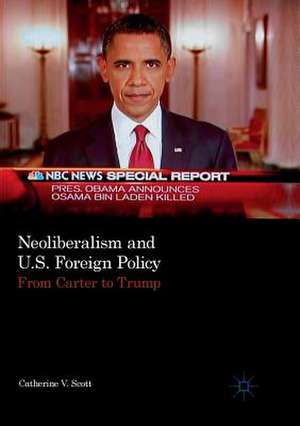Neoliberalism and U.S. Foreign Policy: From Carter to Trump
Autor Catherine V. Scotten Limba Engleză Paperback – 6 iun 2019
| Toate formatele și edițiile | Preț | Express |
|---|---|---|
| Paperback (1) | 581.98 lei 6-8 săpt. | |
| Springer International Publishing – 6 iun 2019 | 581.98 lei 6-8 săpt. | |
| Hardback (1) | 642.18 lei 6-8 săpt. | |
| Springer International Publishing – 31 ian 2018 | 642.18 lei 6-8 săpt. |
Preț: 581.98 lei
Preț vechi: 684.68 lei
-15% Nou
Puncte Express: 873
Preț estimativ în valută:
111.37€ • 116.81$ • 92.71£
111.37€ • 116.81$ • 92.71£
Carte tipărită la comandă
Livrare economică 01-15 aprilie
Preluare comenzi: 021 569.72.76
Specificații
ISBN-13: 9783319890685
ISBN-10: 3319890689
Pagini: 260
Ilustrații: XIII, 260 p.
Dimensiuni: 148 x 210 mm
Greutate: 0.36 kg
Ediția:Softcover reprint of the original 1st ed. 2018
Editura: Springer International Publishing
Colecția Palgrave Macmillan
Locul publicării:Cham, Switzerland
ISBN-10: 3319890689
Pagini: 260
Ilustrații: XIII, 260 p.
Dimensiuni: 148 x 210 mm
Greutate: 0.36 kg
Ediția:Softcover reprint of the original 1st ed. 2018
Editura: Springer International Publishing
Colecția Palgrave Macmillan
Locul publicării:Cham, Switzerland
Cuprins
1. Foucault, Carter, and Trump? Neoliberalism and U.S. Foreign Policy.- 2. From Rambo to Jack Bauer: Neoliberal Masculinity in an Age of Terror.- 3. From Captives on the Frontier to Saving the World.- 4. Exceptionally Diverse: Neoliberal Multiculturalism, Race, and Risk.- 5. Neoliberal Patriotism.- 6. The Trump Test: Neoliberalism, Foreign Policy, and the 2016 Election.
Recenzii
“The book’s stated aim is ‘to complicate, challenge, and offer revisions’ against those ‘who reach for early eras of foreign policy or undertake institutional analyses to draw connections between the national security state of the Cold War era and today’s national security apparatus in order to explain current US foreign policy.’” (Roger Chapman, Cercles, cercles.com, January, 17, 2019)
Notă biografică
Catherine V. Scott is Professor of Political Science at Agnes Scott College, USA. Her publications include Gender and Development: Rethinking Modernization and Dependency Theory (1996) along with numerous articles.
Textul de pe ultima copertă
While there has been a flood of scholarly efforts to extend, adapt, and revise Foucault’s exploration of the emergence and operations of neoliberalism, the study of foreign policy has remained steeped in the analysis of partisanship, institutions, policies, and personality and their influence on various issue areas, toward particular countries, or specific presidential doctrines. This book brings the political rationality of neoliberalism to bear on U.S. foreign policy in two distinct ways. First, it challenges, complicates, and revises the numerous interpretations of U.S. nationalism that posit a homologous relationship between “1898” and contemporary nationalism, instead arguing that alterations in the operations of capitalism and its correlative forms of governance have produced a differently formatted nationalism, which in turn has produced different operations of U.S. hegemony in the twenty-first century that markedly depart from earlier eras. Second, this book argues for a new timeline—one that starts with the Carter-Reagan era and the crisis of capitalism—ultimately encouraging us to think beyond particular presidencies, wars, bureaucratic politics, and policies in order to train our sights on how long-term and sustained shifts in the economy and attendant government practices have emerged to produce new myths of exceptionalism that more fully cohere with the neoliberal foundations of the U.S. nation-state.
Caracteristici
Challenges, complicates, and revises the numerous interpretations of U.S. nationalism that posit a homologous relationship between “1898” and contemporary nationalism Shows how alterations in the operations of capitalism and its correlative forms of governance have produced a differently formatted nationalism Argues for a different timeline of U.S. foreign policy that starts with the Carter-Reagan era and the crisis of capitalism
